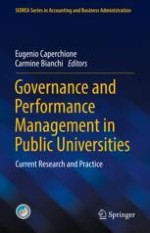2022 | OriginalPaper | Buchkapitel
An Analysis of Methodologies, Incentives, and Effects of Performance Evaluation in Higher Education: The English Experience
verfasst von : Giovanni Barbato, Matteo Turri
Erschienen in: Governance and Performance Management in Public Universities
Aktivieren Sie unsere intelligente Suche, um passende Fachinhalte oder Patente zu finden.
Wählen Sie Textabschnitte aus um mit Künstlicher Intelligenz passenden Patente zu finden. powered by
Markieren Sie Textabschnitte, um KI-gestützt weitere passende Inhalte zu finden. powered by
